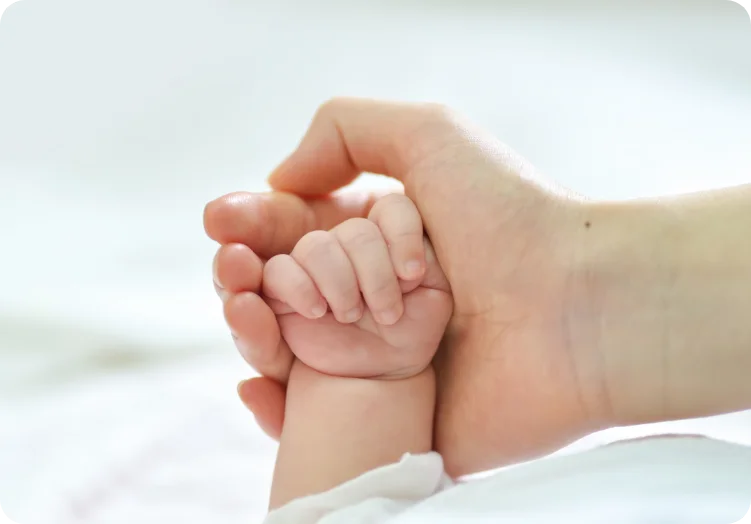Fertility
Fulfil your dreams of having a baby.
Fertility challenges can be stressful and heartbreaking, making the journey to parenthood difficult. Many things can influence the success rate of natural conception, including diet, timing, lifestyle habits, and hormonal balance in either partner.
Dr Ljiljana is dedicated to helping women address health issues that may be affecting their ability to conceive. She provides expert guidance on herbal remedies, nutrition, lifestyle changes, and timing techniques to help optimise your chances of conceiving naturally.

Factors Affecting Infertility
There are many factors that can affect your chances of falling pregnant, including:
- Age
- Being overweight or underweight
- Lifestyle factors, such as extreme exercise, smoking, or alcohol use
- Medical conditions or diseases (e.g., endometriosis or fibroids)
- Injury to the reproductive organs
- Medical treatments, such as chemotherapy or radiation therapy
- Genetic factors (e.g., a history of early menopause)
- Sexually transmitted infections (STIs)
- Your partner’s sperm count, shape, and mobility
- The time in your cycle when you are trying
Dr Ljiljana will be able to check both yours and your partner’s fertility and offer guidance on how to increase your chances of success.
Fertility and Ovulation
When you’re trying to conceive, being able to track your body’s changes each month as well as knowing how to work with your body can help you achieve your dream of having a baby.
Understanding Ovulation
Ovulation occurs when hormonal changes in your body signal your ovaries to release a mature egg. This occurs in the middle of your cycle, between 12 and 16 days before your period is due.
As you approach ovulation, your body increases production of the oestrogen hormone. Oestrogen causes the lining of the uterus to thicken and helps to create a sperm-friendly environment. Increased oestrogen levels cause the release of high levels of luteinising hormone (LH) which triggers the release of the egg from the ovaries within 24 to 36 hours. High levels of LH are a good predictor of fertility.
The egg travels from the ovary down to the fallopian tube, where fertilisation may take place if sperm are present. Once the egg is released, it remains viable for around 24 hours. If fertilisation doesn’t occur, the lining of the uterus will break down and you will begin menstruation.
The most accurate method of predicting ovulation is with an ovulation kit that predicts the rise in LH levels 24 to 36 hours before ovulation. Another option is taking your basal body temperature each morning, which rises when your fertility window ends, helping you better understand your cycle. Dr Ljiljana can advise you on how to track your ovulation.
Timing Intercourse
When it comes to ovulation, timing is crucial. The fertility window refers to the time when it is possible for you to fall pregnant.
Sperm can remain viable for five days, so the fertility window occurs during the six days leading up to and including the day of ovulation. The chances of falling pregnant outside of this fertility window are close to zero. Ensuring that you time your intercourse to coincide with the fertility window is vital for falling pregnant.
The Fertility Diet
The fertility diet focuses on providing your body with the specific nutrients needed to fall pregnant, stay pregnant, and deliver a healthy baby. The diet choices you make today will influence the health of your eggs in 90 days, as the food you consume plays a crucial role in balancing hormones and supplying the necessary building blocks for supporting a growing baby.
Fertility with Dr Ljiljana
Dr Ljiljana offers a variety of tests and treatments to help with fertility, including endometriosis treatment, removal of fibroids, IVF treatment, testing your partner’s sperm health, and testing for other conditions possibly affecting fertility. She also helps in the management of PCOS and offers advice on natural fertility methods.
Tracking Your Cycle
When you’re trying to conceive, tracking your cycle can help pinpoint when ovulation occurs. It will also help you and Dr Ljiljana understand any issues you might be having with fertility. Here are some tips to help you ensure you’re tracking your cycle correctly:
- Day 1 of your cycle is the beginning of your period, and the last day is the day before your next period starts
- Ovulation occurs 12 to 16 days before your period is due
- Your fertility is at its best in the three days leading up to ovulation. For example, if your cycle is 28 days long, your most fertile days will be days 12, 13, and 14
Use an online ovulation calculator, and keep an accurate record of your cycle to ensure you know when your fertility window is open.

Using Medication for Induction of Ovulation
Before considering other treatment such as in vitro fertilisation (IVF), and depending on your specific situation, Dr Ljiljana may recommend an assisted fertility treatment to stimulate the ovaries into releasing eggs.
Letrozole and Clomid (clomiphene citrate) are the most widely used fertility treatments. Letrozole is especially helpful for women with PCOS. With this type of treatment, about 70% of women will ovulate and 40% of them will fall pregnant within 90 days. When used in conjunction with an ovulation tracking cycle, Clomid can help you predict when you will have the highest chance of conception during your cycle.
Endometriosis, Patency of Fallopian Tubes, and Fibroids
It is important to be assessed for endometriosis, patency of fallopian tubes, and fibroids when planning a family and before considering fertility treatment as they are three of the most common conditions affecting female fertility.
Endometriosis greatly affects your success rates of natural conception and can reduce your chances of IVF success. It affects up to one in three women and is caused when tissue from the lining of the uterus attaches itself to the ovaries and fallopian tubes. Studies have shown that in cases where this condition has been confirmed and removed, the chances of falling pregnant naturally has increased by almost 50%.
Fibroids are commonly occurring benign lumps of muscle and tissue that grow on the wall of the uterus. They can reduce embryo implantation and increase the risk of miscarriage, making removal of fibroids prior to attempted conception recommended.
You can discuss treatment options and how they may improve your chances of natural conception with Dr Ljiljana.

Dr Ljiljana Difference
Dr Ljiljana knows that women tend to prioritise the needs of everyone else before their own, which means their health concerns are often overlooked. This is why Dr Ljiljana takes her time listening to you and understanding how you wish to be treated. She then applies her skills and expertise to provide the best possible care with positive outcomes.
